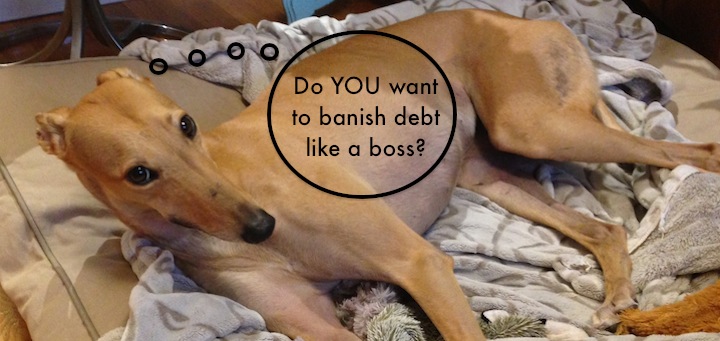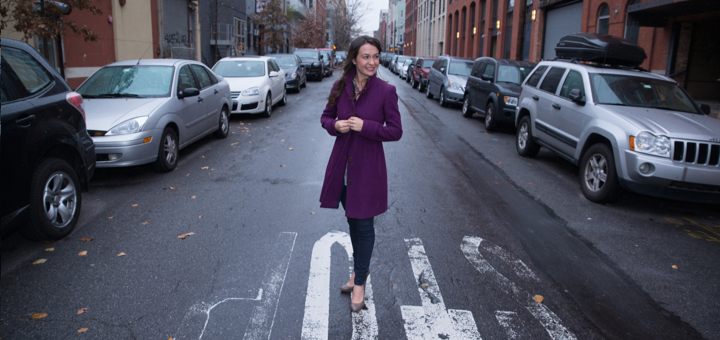Welcome to Part 2 of our Demystifying Personal Finance Series! Debt repayment is a crucial step in attaining financial freedom and I originally wrote a post about debt repayment myself. But, it was terrible. Since we’ve never had any debt other than our mortgage, it was full of conjecture about what it “must feel like” to have debt and work towards paying it off. Be glad you didn’t have to read it.
Mr. Frugalwoods and I instead came to the conclusion that we shouldn’t write about what we haven’t experienced. And so, we invited Kim Parr, from Eyes on the Dollar, to share her personal experience and wisdom around debt repayment. We’re delighted to have her here on Frugalwoods today!
By: Kim Parr, Eyes on the Dollar

I’m honored to be in the midst of the Frugal Weirdos today talking about how to pay off debt. Hopefully, many of you have avoided debt like a greyhound avoids bathing, but for those who struggle with monthly payments and credit card spending, this post is for you.
My husband and I found ourselves stuck with over $30,000 in credit card debt a few years ago. To say it was stressful would be like saying this winter in Boston has been chilly. It ruled our lives until we took control. Today, I’d like to share how we paid off debt and how I believe you can too.
Tracking Spending: The First Step In Any Get Out of Debt Plan
Do you often find yourself scratching your head at the end of the month because it seems like there should be more money left? The only way to really know and fix your spending leakage is to keep track of every penny that comes in and out. It’s pretty easy these days with sites like Mint or Personal Capital.
One thing all people in debt have in common is that their spending is greater than their earnings. I guarantee you’ll be surprised at how crazy some of your spending actually is once you sit down and track the money. We had no idea we were spending $1,000 a month on food or $300 a month on entertainment. In our heads, it seemed like much less. You can’t argue with numbers and that’s why tracking spending is so important. After you have an honest picture of where the money is going, you can finally make a realistic plan to get out of debt.
Being Emotionally Ready To Pay Off Debt
Anyone can focus themselves for a period of time to achieve a certain result. This is true with weight loss, education, skills training, or paying off debt. The problem with having a laser focus for the short term is that it’s not sustainable without the emotional maturity to make it stick for life.
We had several trial runs with paying off debt. Twice, we paid our credit card balances down to zero, but weren’t ready to change the way we thought about money. As a result, we rebounded back into debt within a few months. How did we change our habits and make debt freedom stick?
Making Specific Goals

Saying you want to get out of debt is too broad. It’s like saying you want to be rich or you want to quit your job. Lots of people want these things, but few take the time to know why.
In our case, I wanted to get out of debt so I could work fewer days in the office and be able to spend more time with our daughter. My husband, Jim, wanted to go back to school and eventually work in education administration. We couldn’t withstand the salary and stability variation these goals created until we got out of debt.
As secondary goals, we wanted the security that debt freedom brings. Without debt, it’s fine to take some time off or have a low income month. You have options. But if the almighty monthly debt payment hangs over your head, the options are work, work, and more work.
Give Money A Purpose
Does your money work for you or do you work for your money? The easiest way to give money a purpose is to make a budget. If you’ve never budgeted, it can be a challenge, but after awhile you’ll get so good at it that you might not even need to budget anymore.
Be realistic. If you’re used to spending $1,000 a month on food and decide to set your budget for only $100, you will fail. This might lead to discouragement and giving up altogether. Instead, start small and work your way up.
Once you know how each dollar is helping you get to the place you want to be, it’s much harder to commit acts of mindless spending.
Cut Out What You Can
Now that you know where your money goes and how much you want to budget for monthly expenses, it’s time to take a long, hard look at expenses. Some spending might be habitual and painless to remove. Things like subscriptions or memberships you don’t have time to use are no brainers. Calling your internet or cell phone provider for a lower rate takes minutes and can save hundreds of dollars. Question everything you send a payment for and ask if it’s possible to pay less.

When we were in debt, I bought lunch every day from the grocery store salad bar. I thought it was a healthy option and much less expensive than going out to eat in a restaurant. The truth was that I usually spent $10 a day on lunch plus whatever other items I decided to pick up while in the store. That adds up to $50 a week or $200 or more a month! I found that if I buy produce to make my own salad at home instead, the cost per lunch drops to about $1 per salad AND I’m not tempted to buy other things because I’ve removed myself from the store.
I also realized I can color my own hair for about $8 as opposed to the $80 the salon charges. No, DIY is not as relaxing as having someone do it for you, but the cost difference speaks for itself. Find what expenses you can cut or lower from your own budget. Once you’ve found them all, look again. I’m always finding new tips and tricks for lowering our bills.
The other huge part of cutting expenses is mental. Instead of feeling deprived, tell yourself that each dollar you save is a dollar more toward your goal. Also, never say you can’t afford it. You can afford it, you are simply choosing to use money in a more productive way.
Social Spending

It’s fairly easy to keep yourself in check at home, but what about socially? Many people in debt have a lifestyle that includes spending with friends and family, better know as Keeping Up With the Joneses. This one was hard for me because I’m naturally a people pleaser.
You can be honest about your quest to pay off debt or you can simply tell friends and relatives that you are saving money for a big goal. In our case, we never told family about our debt. We didn’t want sympathy or to make ourselves look superior because we were chucking debt to the curb. We knew it would be a hard road and one we would likely walk alone. We found our support in the amazing online personal finance community.
Those who are real friends will support your decisions and might even join in the fun. Those who won’t probably aren’t the friends you need to keep. You can’t change your family, but you also don’t have to go over the cliff with them if they don’t support your new lifestyle. Please yourself and stop worrying about the rest of the world.
Making More Money: The Real Key To Paying Off Debt
It can be a joy and a downer to lower all monthly expenses. The good part is that most people can save a few hundred dollars by cutting expenses. The rough part is that if you’re like us, with tens of thousands of dollars to pay back, it’s still going to take a really long time to get out of debt.

Sometimes the sheer thought of spending years to pay off debt is enough to cause people to give up. I used to say that I would owe Visa for the rest of my life, so why not enjoy it? The problem is that you can’t really enjoy life with credit card debt hanging over your head. Anyone who tells you differently is lying!
The real way to knock debt on its fat keister is to earn more money. With your new frugal lifestyle and with more dollars coming in, you will really start to see those balances falling faster than opponents of the Kentucky Wildcats (Yes, I’m from Kentucky. Go Big Blue!).
If you’re wondering how to tap into this treasure trove of extra cash, don’t reinvent the wheel. The easiest way to make more money is to continue doing what you’re good at, just do more of it. In my case, I took an extra optometry job. Your claim to fame might be consulting, website design, online writing, cleaning houses, walking dogs, or washing cars. There’s no limit to what people will pay you to do.
It sucks to spend what limited free time you might have doing extra work, but keep the end goal in mind. If a few more hours of work per week in the short term gets you out of debt forever, it’s time well spent. I worked at my extra job for 18 months until I got to use a paycheck for anything other than debt. Every penny went to Mastercard, Visa, and American Express. Some months it was depressing beyond words, but it taught me the secret of extra income. Now, there’s no limit to what I’m able to do.
Debt and Beyond
It took us 18 months to pay off over $30,000 in credit card debt. If you do the math, that’s about $1,800 per month toward principal and interest. Once that debt was gone, we had lots of extra money every month. After finally learning the value of a dollar, you can bet we didn’t go on a spending spree. Instead we started investing in our future.

It’s been almost three years since we paid off our credit card debts once and for all. Jim did get his master’s degree in administration and is now an elementary school principal. His salary is now more than double what he was making during our debt payoff journey. I sold my optometry practice and currently spend about three days a week on eyeballs. Strangely, even though I’m working about half the amount of hours, I make more money now than when I owned a practice.
From the sale of my business, we were able to pay off our other pesky debt, which came in the form of student loans. We’ve leveraged Jim’s extra salary to buy rental properties and now own five residential units and one commercial property. All of those will be paid off within the next eight years.
I also make an extra $5,000-$10,000 per year with blogging and online writing. I honestly started a blog to document my journey and never planned on making a penny. It’s funny how things start falling into place once you have a purpose and a plan to make it happen.
Our new purpose is to retire in nine years when I’m 50 and Jim is 54. It’s not sexy, like retiring at 30, but our plan should still give us plenty of years to live life on our terms. Considering where we started, it makes me downright giddy to know we won’t have to work until we’re old and gray (well, I’ll never be gray because I’m so good at home hair color now!)
If you struggle with debt, today is the best day to start working toward the future. Even though society gives its blessing to those who live by monthly payments, I can say with 100% certainty that life without credit card debt is a million times better.
Kim Parr is an optometrist, blogger and reformed spender. She loves foster dogs, helping people get out of debt, real estate, and enjoying the outdoors with her family in Southwest Colorado, not necessarily in that order. Find out more about her at Eyes on the Dollar.

Mr. Frugalwoods’ Technical Nerd Corner
Since I love spreadsheets, and also can’t help myself, I wanted to include a discussion of the methods and math behind the debt payoff equation.
Consolidate Debt If Possible
If you have student loan debt, see if you can consolidate and refinance it into a lower interest rate. This is often an easy win, and in addition to paying less interest, there’ll be less complexity around your monthly payments.
Once you have your debt consolidated (if applicable), it’s time to accelerate paydown. No sense in paying interest for the entire length of a loan, so let’s get it out of the way now!
Pick A Payoff Method
There are two prevailing theories about the “best” way to pay down debt: the Avalanche Method and the Snowball Method.
For both methods, the first step is determining the minimum monthly payment on each debt. Next, figure out how much extra money per month you have to put towards your debt.

The Avalanche Method states that you should put all extra money towards your highest interest rate loan. Once you pay it off, move to your next highest interest rate loan. Use all the money you were putting towards your first debt and put it towards your next debt. Each time you pay off a debt, the amount of money you have to dedicate to debt repayment grows.
The Snowball Method espouses picking your smallest dollar amount loan and focusing all effort towards paying it off. Once you pay it off, move to your next smallest dollar amount and focus all of your money towards paying it off.
Mathematically, the Avalanche Method comes out ahead. Using that plan you’ll pay less interest and eliminate your debts sooner. Usually, it’s not much less interest or that much sooner, but, there is a mathematical advantage.
However… I often counsel friends to go with the Snowball Method. Why? A combo of two benefits:
- It’s psychologically rewarding to pay off debts entirely. Paying off two $5,000 debts makes people feel more accomplished than paying off $10,000 of a $30,000 debt. For many people, debt repayment is going to take a long time and anything that makes them more likely to stick with the program is valuable.
- Snowballing frees up monthly cash flow, giving you money for stuff other than loan payments–for example, an emergency fund. For most folks, paying off a few smaller loans in their entirety puts them in a less precarious financial situation month-to-month.
Two exceptions to the “pay down debt now” rule
Exception 1: Low interest rates. If your debt is locked into a super low interest rate (which I define roughly as anything under 4%), it might make more sense not to pay it off early and instead invest that extra money. The theory being that if you can get a better return out of the stock market than you can from paying back your debt, you should go for it.

There is, of course, the risk that your invested money won’t grow at the rate you forecasted. Thus, this strategy isn’t for everyone, and you’ve got to gauge your own comfort level with risk before deciding to invest rather that accelerate debt payback.
Exception 2: Free Money. If you’re eligible for a 401K match from your employer, it often makes sense to invest enough in your 401K to receive those matching funds even if you have high interest rate debt. Hard to beat a 100% return on investment!
The risk with this strategy is that your 401K contributions are locked up for many years, while your debts demand repayment now. If you tend to live close to the financial edge, you’ll probably be better served by paying back debt even if you are giving up delicious matching funds.
Banish Your Debt
Whatever method you pick, knocking out debt as fast as possible is essential to your future financial success. Debt is an anchor weighing you down. Think about how amazing it would feel if a year from today you looked at your finances and realized you’d cut your debt in half… or paid it off completely! Start today, be fearless, and don’t hold back. No debt is safe from your repayment vengeance!








Great story and great tips! Your have to be ready to make a change in your money habits to pay or debt or gain control of your finances, once you mentally make the leap, most of the techniques are straight forward common sense type stuff. Add a little discipline and you’ll be a winner.
Being really ready to make that change was the hardest part for us. After that, it all fell into place.
It really motivates me to read stories of people who have paid down their debt because it makes me hope that we can succeed too. I have the same motivation when I read stories of people who have never had debts because I hope my children can be successful with that. Thank you to both!
You absolutely can succeed. The time frame or how many times you slip up really is irrelevant if you have the motivation to stick with it for the long haul.
It would have been better not to have had it in the first place — but since I did, I can say that paying off my student loan debt was one of the more satisfying moments of my adult life. Go for it, folks! Also, the greyhound’s snow outfit is adorable.
I do wish we’d never racked up so much debt, but paying it off was one of the best life lessons we could have ever learned. I do believe that if we’d never had real debt that took some focus to pay off, we would have pecked along and worked until our mid 60’s because we wouldn’t have had that experience that taught us how much we can do if we put our minds to it.
I had about $10,000 of credit card debt that I couldn’t budge for years. I’d pay it down a couple hundred dollars but it would always creep back up. I was at a fairly low income for the first 5 years out of university (I’ve almost doubled my income in the last three years). It didn’t leave much money to pay on my debt especially since I sometimes used my credit card to pay regular expenses. I also worked strange shifts or late evening work. Once I got my full time job as a public servant I had a great schedule 8:30-4:30 Monday to Friday. This finally gave me the ability to go out and get a second job. I had wanted to do it years before but it was never a viable option. The majority of what I made when straight to my debt and after about a 16 months I had it all paid off. That might seem like a long time but I’m single and live on my own. Since then, I have overspent a couple times that led me back in to some debt but now it’s so much easier to get back on track. Generally if I have a spendy month I can get things back to where they should be in about a month. It’s not ideal to slip back but I notice it does happen a lot less frequently now.
I really enjoyed this post and the picture of Frugal Hound with the apple on her head. 🙂
Extra income really is the way to knock out debt. It’s not fun to work more, but the results speak for themselves.
I totally love all these tips! By making more money and having a side hustle would be a big help when you want to be debt free.
Side hustles and multiple stream of income are key to getting out of debt and building wealth.
There’s so much great info here – thank you!
My husband and I are currently paying off almost $60K in credit card debt (gulp!), and we recently closed on a home equity loan to save on interest and enable us to pay it down faster. Yes, it’s frightening to have our house on the line, but it also gives us extra motivation. Equally frightening was when I started tracking our spending – yeeks!
Tracking our spending was a huge eye opener. It’s amazing how much money you can waste and have really nothing to show for it. Best of luck with your debt payoff and congrats on taking control of the situation.
Yes, Yes, Yes! I’ve been a huge fan of Eyes On The Dollar for quite a while now, so it was really inspiring to hear their story!
Thanks, Gretchen. I’m not proud of being in so much debt, but I am happy if my story can help others in similar situations.
I liked your comment about you and Mr. FW not writing about what you haven’t personally experienced. Both of you are mature and wise beyond your years.
Absolutely second that thought!
Thank you so much! That’s really kind of you to say!
Fantastic. It’s awesome that you guys were able to pay that much off. We were in a similar boat with student loans and paid off ~25k in about the same timeframe. Then it was save up for down payment, and now it’s piling it into the mortgage.
We’re over the 4% mark a bit, and the stock market is still soaring. If there’s a big recession, I’ll probably focus on maxing out my 401k and Roth’s before putting the money into the mortgage since I’d expect a better longterm gain. I don’t have a hard # for what that would be right now though, so it’s more of a wait and see approach. I also think that it’s the lesser of two really good things!
And +1 for the snowball method. It’s similar to a lot of diets. People understand the numbers but we have those stupid feelings and urges that get in the way.
Even knowing that investing in stocks is probably the better long term gainer, I have never heard anyone who paid off a mortgage say they regretted it. Congrats on paying off your debt and making your money work for you and your family.
“The real way to knock debt on its fat keister is to earn more money.” I agree with this completely. Nothing wrong with being frugal but you can only go so far with that. Earning more income theoretically has no limit.
If you can earn more income and put that extra money into something that continues to earn, the dollars add up pretty quickly!
We should be completely debt and mortgage free in 2 years and change. They key might be that neither my wife and I had a credit card until a few years ago when started signing up for travel points, and we never carry a balance. But we are still paying off student loans from over 10 years ago, which has been a drag on our finances. When people talk about the impending student loan bomb, I believe them.
We’re also paying everything off, despite it all being under 4% interest. Your point about making more than 4% on the stock market is well put. It is just a THEORY, when paying off debt is a sure thing.
Just curious, where is that picture with the mountain in the background? Rocky Mountains? Looks nice.
You can look at interest rates all day, but being completely debt free has a pretty profound appeal. That picture is by the Maroon Bells near Aspen. We live in Colorado, so there are many, many beautiful photo ops.
I’m not a fan of the snowball method for many of the reasons you noted above. But everyone is different and it is just not about the money, it’s also about how you feel and what lets you sleep at night. I just wrote about my student loans and their low 3% interest rate. I’m battling the idea of milking out the payments and investing, or just paying them all off since they are somewhat a nuisance. So far I settled in the middle and am just paying extra so they are paid off sooner than the term of the loans.
Student loans are a nuisance. Ours were at a fairly low rate, but as we are now in our 40’s, it made the most sense to get rid of them and clear the slate. I really don’t have a favorite between the snowball and avalanche methods. We did some of both depending on the month. It really doesn’t matter as long as the balances keep dropping.
Great tips Kim, I used many of them myself when I was paying off my debt years ago. It took me some time to get emotionally ready to pay off debt and once I realized I was holding myself back I started throwing all I could at it and earning as much as I could. I consolidated most of my debt – some was at 0% and the rest was sub 10%. I went with the snowball approach for maybe the first 6 or so months but woke up to seeing that the Avalanche method was going to kill it the fastest way possible.
I think we did some of both as well. Maybe we should invent a new method called the Blizzard!
Fun post and the pictures are still hilarious. I like how the story went for Kim, it shows real boss like attitude to get rid of debt so quickly. Also you can now refinance old debt into a cheaper rate with all the great options. Good Luck.
We did consolidate all of our balances into 0% once we paid off about half of the debt. Getting rid of the interest part of the payment really sped up the whole process.
Great story and tips, Kim! I’ve found that being in the right mindset emotionally is definitely the most important factor for me in accomplishing any goal, paying down debt included! Making more money on the side can help pay off debt more quickly as well, as long as all of your other advice is still being applied, of course! No sense in making more money if you’re just frivolously spending it 🙂
Amen! We were high earners for years, but we ended up spending all that money plus using credit to buy even more stuff that we certainly didn’t need and really didn’t value. Until we figured that out, we had no chance of staying out of debt. It’s funny how two pretty smart people can be so dumb when it comes to money. I think it was part denial, part ignorance, and part feeling like we deserved a certain lifestyle, regardless of whether or not it made us happy.
Don’t worry, my hubby and I had our fair share of being really dumb with money too. It was definitely related to feeling deserving of a certain lifestyle and thinking that “things” would help fill a void that stressful jobs and a poor work-life balance created for us.
Wow, what a success story Ms.Parr!I love the part about the DIY part! It sure is very hard but I think every expense is worth saving when you’re in debt.
When you are paying down debt, every dollar counts.
Great post Kim! I’m working my way out of my $30,000 debt and I had to seriously work on living below my means. Things are less stressful now that I’m not spending everything I earn and I’m able to focus on getting out of debt. I prefer the avalanche method because I despise interest and my motivation is earning extra income to make nice large payments on my debt each month. It’s a working progress, but I know it’s only temporary and I’ll get there soon.
It is only temporary and if you tell yourself that every time you want to go shopping or out to eat, I think it really helps. I feel we now we have everything we need and most of what we want, all while spending way less than we used to. Even though we could spend more now that we don’t have debt, we would rather put our money toward the future rather than buying things that will only seem relevant for a minute or two.
I always think it’s a great idea to earn extra income if you are serious about paying off debt. It’s a win-win because it also keeps you busier and hopefully breaks spending habit you might have created with idle time.
That’s a great point. If you keep yourself busy, you have no time to shop!
Never get tired of hearing your story, Kim. I hear you on the DIY hair color too. I do miss the experience, but I certainly don’t miss the several hundred dollars a year I used to spend at the salon. 🙂
Someday, I will just own gray and be OK with it. Until then, Sally Beauty Supply is my friend. Can’t wait to read your story when all your debt is gone.
We are a prime example of why you won’t pay off your debt until you set concrete goals. We have been in debt for years. Sometimes, we would make some progress by paying off one of our credit cards. We knew debt was bad, and it felt good to pay it off. The problem was that afterwards we would lose any sense of urgency and just fall back into our old habits. Only now that we’ve set goals have we started to make steady and significant progress.
Thanks for the additional motivation to kill our stupid debt!
Yes, kill that stupid debt! Having goals does make a huge difference.
This is really good motivation for anyone living paycheck to paycheck and wanting to see something left at the end of the work week. Tracking your spending, every single last penny for a month will put to light all the places where you can save. Once you do that and are emotionally ready to take the next leap, you will find that it really is easy. Start with small steps and each month thereafter build on that. You need to be reasonable in your goals. It’s not enough to just say okay, down to the last penny, we’ll do without all this stuff and pay off the loans. Sure as God made little green apples, you’ll justify a needless expenditure and then next week it will be 2 and before you know it those old habits come back. Think of it as being on a strict diet and you are not allowed anything with a grain of sugar. Give it time and you’ll eat a whole pie with a side of Ben & Jerry’s. Most of us need a small reward of some sort, so budget that into the month. As soon as you can, tuck a bit aside each week for a bonafide emergency. Even if it is only 10.00 a week to start, in time it will add up and you can add more as your debt is paid down. We found having our credit union make a savings deduction each payday was easiest for us. We didn’t see it, so it didn’t get spent.
And most important, if you have children, bring them on board. Think of the quality time you can spend together and the life lessons you can teach your children, once all the electronics are turned off. Have them help you plan meals, pour over recipe books, cut coupons, shop with you & your trusty list, avoiding impulse purchases and then have them help with meal preparation. Instead of purchasing something from the chips isle, show them the cost of said chips that will last a day compared to home made cookies that will last most of the week and then all of you bake said cookies. These are small steps to saving with priceless times spent with your family members.
It is so true that debt repayment is very much like dieting, very difficult at first. Then, once you establish a routine, you actually start to enjoy it or at least you enjoy the results.
Great advice Kim!! I think the most important thing with fighting debt is to emotionally prepare for the journey. Unless you win the lottery, it is going to take some time to pay it off and the better prepared you are mentally for that journey, the more successful you will be.
Being prepared mentally is as important as the actual repayment of money. Otherwise, you’re very likely to fall back into the same pattern.
Great tips, Kim. I love seeing (or reading) how your life has changed since you got rid of debt and took back control of your money. You’re building a beautiful life for your family and that is such a powerful feeling.
Thanks Shannon. It is a very powerful feeling to be in control.
Mr. FW’s reasons are exactly on-par with my thinking too. I haven’t been focusing extra money on low interest debt (like my mortgage) because hello I have way higher interest debt to pay off first. I also decided to keep contributing to my employer-sponsored 401K to get their full match. I do contribute a bit more than necessary to get the full match, but I’m okay with that. In fact, I have a goal to increase my contributions by 1% each year (in January).
That sounds like an excellent plan. Never turn down free money!
30,000 in 18 months is phenomenal, that must have taken crazy discipline. Cutting spending and increasing saving is really the only way to get out of debt faster. Thankfully, we have been able to keep our debt well under 4%, but it makes it hard to balance investing with something like paying off our low interest mortgage. I think there comes a point when it makes sense to tackle that low interest debt and invest.
Excellent point about tracking spending. Unfortunately there is some up-front “heavy lifting” when it comes to paying off debt. Without that initial effort to actually have a clear picture of your finances it’s very difficult to pay off debt. To use an example from my job, it would be like having the ending net income figure from January, February, and March, and no additional detail. I can’t really speak to what is driving the change or make productive changes to our business.
I was pretty motivated because my husband brought $20,000 in student loan debts to the relationship. I was on disability at the time, so we had to really put our nose to the grindstone. Especially when we had to add $12,000 for medical expenses.
We mainly tackled the higher interest debt first, but we did split our focus toward student loans too, I guess.
I just banished another one of my student loans! Only $8,633 left in student loan debt left. I just recently wrote a post about how getting out of debt is the best gift I can give myself. Freedom from debt means I control my life and no one else!
Kim, it’s so exciting you will be able to retire in nine years. Is your rental income what you will use until retirement kicks in?
We seem to be on a debt roller coaster. We get it all paid off and then, before you know it, we have charged $8,000. Recently, we paid off our smallest credit card using the ‘snowball method’. It was gratifying but I think it would have been beneficial to our credit score to pay towards the higher balance.
I am sure the dogs were ready to help. Did you do the eye exam and write the prescription for the dog with the glasses? Or did the dog just buy a pair of readers on its own?
I the personal finance series. Like the Frugalwoods I’ve never had anything but very low interest debt. I especially liked your line from the last post about compound interest being the magic unicorn of personal finance (and used it but gave you credit in a presentation to college students the other day).
Great post, Kim! I’m not sure I’ve ever read your debt payoff story before. I love the 1-2 punch of lowering expenses and increasing income. SO powerful!
A subject near but not so dear to my heat. Law school resulted in about $85,000 of student debt (and that’s actually a good figure compared to many classmates). I’m working on paying it off now. Great tips, Kim!
*heart lol oops
Consumer debt is the enemy!
I work for a large credit card company and have had on occasion listened to callers desperate to open a new credit card with 90 days no interest or no payments . “Can I transfer my balance” . They are seeking relief from oppressive credit card debt . If your household has card debt the average balance is $15k in America – that’s $3,000 a year in interest. Many of us can do a lot with $3,000… Scary stuff.
Definitely!
Good article!
One of your main points is that you have to be emotionally ready to cut down debt. You said “The problem with having a laser focus for the short term is that it’s not sustainable without the emotional maturity to make it stick for life.” This is very true. In my case, I cannot remember now what made things click in my mind. I just remember that one day it just became emotionally unacceptable to me to be carrying the debt and be paying interest on it.
Very true! You’ve definitely got to have the mindset that you’re ready to do it.
Great post Kim! I 100% agree with the steps you laid out and it is great to see that they worked for you. We are on the road to paying off over $350,000 in debt and have taken all of these steps in the past several months. It’s amazing how easy this is now that we are tracking our spending and we have a goal. We plan to pay all $350,000 in five years – plus start a family! It’s going to be a wild ride, but we can’t wait for the freedom that we will enjoy when we are 100% debt free.
It is a mind set thing; we need to be ready mentally to fully examine our spending lives and to then make specific changes FOREVER to get us into better financial position. We currently have a modest mortgage on a very reasonable rate that we do overpay (but could absolutely overpay more had we the extra wherewithal!). At current rate, we *should have it paid off completely in about 8-9 years. We have some credit card debt that is a bit of a millstone though it is definitely not wildly high or eye-watering in terms of amount… just seemingly impossible to fully and completely get rid of… the interest rate isn’t terrible, but we SHOULD pay it off in full each month and reserve the card for proper planned things OR true, life-altering / threatening emergencies. Not… food. Ahem.
We’re in South Africa so the economy is clearly entirely different and not totally comparable, but the principles apply; examine your situation properly, track what you spend, see where you can spend less, even in fairly small ways, then commit to a long term specific goal… and ideally try to earn more, even just a little. It’s not rocket science AND YET… which is where the emotional / fear / anxiety comes in. But no more.
2016… here I come.